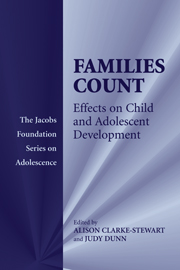Book contents
- Frontmatter
- Contents
- List of Contributors
- Introduction
- PART ONE RISK AND RESILIENCE
- PART TWO PEERS AND PARENTS
- PART THREE WORK AND FAMILY
- PART FOUR DISCORD AND DIVORCE
- 8 Marital Discord, Divorce, and Children's Well-Being: Results from a 20-Year Longitudinal Study of Two Generations
- 9 The Influence of Conflict, Marital Problem Solving and Parenting on Children's Adjustment in Nondivorced, Divorced and Remarried Families
- 10 Adolescents' Development in High-Conflict and Separated Families: Evidence from a German Longitudinal Study
- PART FIVE NEW AND EXTENDED FAMILY FORMS
- PART SIX CONCLUSIONS AND COMMENTARIES
- Index
- References
10 - Adolescents' Development in High-Conflict and Separated Families: Evidence from a German Longitudinal Study
Published online by Cambridge University Press: 05 June 2012
- Frontmatter
- Contents
- List of Contributors
- Introduction
- PART ONE RISK AND RESILIENCE
- PART TWO PEERS AND PARENTS
- PART THREE WORK AND FAMILY
- PART FOUR DISCORD AND DIVORCE
- 8 Marital Discord, Divorce, and Children's Well-Being: Results from a 20-Year Longitudinal Study of Two Generations
- 9 The Influence of Conflict, Marital Problem Solving and Parenting on Children's Adjustment in Nondivorced, Divorced and Remarried Families
- 10 Adolescents' Development in High-Conflict and Separated Families: Evidence from a German Longitudinal Study
- PART FIVE NEW AND EXTENDED FAMILY FORMS
- PART SIX CONCLUSIONS AND COMMENTARIES
- Index
- References
Summary
As in many other Western countries, divorce rates have steadily increased in Germany during the past century (Engstler & Menning, 2003; Walper & Schwarz, 1999). At present, 37 percent of all marriages in Germany are estimated to end in court, placing Germany at an average level of risk for divorce when compared with other European countries. Not surprisingly, the rise in divorce rates was accompanied by an increase in the number of children growing up in single-parent families. Since 1975, the number of single-parent households grew by about 50 percent. In 2000, 15.4 percent of all children below age 18 lived with a single parent (Engstler & Menning, 2003). An additional 5.5 percent had a stepparent in their household, either married to or cohabitating with their biological parent (Teubner, 2002).
Although much public concern has focused on the risks of marital break-up and single parenting for children's development, the consequences of parental separation and remarriage for children and adolescents have only recently been addressed by systematic research in Germany (Walper & Schwarz, 1999). The largest body of evidence concerning the development of children from divorced and separated homes still comes from the United States (see Amato, Chapter 8 and Hetherington, Chapter 9 in this book) and guides educators and counselors, as well as policy making in other countries. In this chapter, we present findings from a longitudinal study conducted in Germany to investigate adolescents' development in nuclear and separated families, the latter including single mother and stepfather families.
- Type
- Chapter
- Information
- Families CountEffects on Child and Adolescent Development, pp. 238 - 270Publisher: Cambridge University PressPrint publication year: 2006
References
- 14
- Cited by

